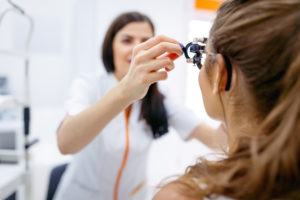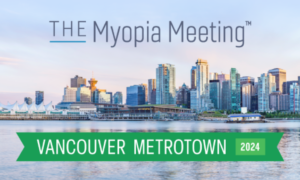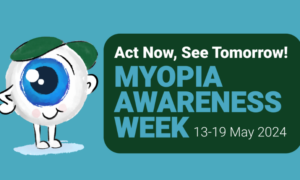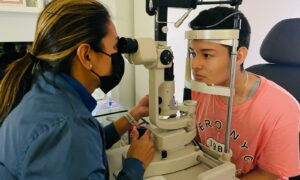sponsored content
August 16, 2021
By Carla Mack, OD, MBA, FAAO, FBCLA; Kelly Vaupel, MS; R. Alan Landers, OD, MS, FAAO
The more that ECPs make the effort to stay up to date on the latest research and guidance, the better they’re able to treat their patients.

The field of myopia management is ever evolving, and for eye care professionals, staying on top of the latest evidence-based research and treatment management is crucial to ensuring that each myopia patient is receiving the highest quality of care. It’s also important to know where to access this information and what resources are available.
A recent survey conducted by Jobson Optical Research and Review of Myopia Management asked ECPs to report on their experience and knowledge of myopia management. While the survey touched on everything from how proactive practitioners are in starting myopia management treatment to which treatments are being prescribed, it also focused on ECPs’ continuing myopia education, including what areas they hope to learn more about and how they go about accessing new information. Based on their responses, evidence-based clinical guidelines and treatment protocols, myopia management soft contact lenses, and myopia control spectacles topped the list of areas of interest. When it came to how ECPs seek out myopia-related educational resources, the top three responses were: online CE courses, online journals such as Review of Myopia Management, and peer-reviewed print journals.
However, myopia management education goes beyond just a few topics or online outlets. The more that ECPs make the effort to stay up to date on the latest research and guidance, the better they’re able to treat their patients. Eye care organizations and companies have created myopia management educational resources specifically for ECPs that are consistently updated to reflect the most current findings and recommendations.
Access These Myopia Management Resources for ECP Education
The goal of continued education for myopia management is to give practitioners even more tools to most effectively treat their myopia patients. To streamline that process, the following list compiles some of the most valuable resources for practitioners looking to maintain their myopia management education, which includes everything from videos and visual aids to peer-reviewed articles and podcasts.
- The International Myopia Institute’s (IMI) 2021 White Papers: The IMI White Papers are a collection of papers designed to continue the advancement of myopia diagnosis, treatment, prevention, and public awareness. Leading experts in the myopia management field have collected the most up-to-date research to share with practitioners, industry leaders, and researchers, with the goal of making this information as widely accessible as possible. Some of the topics in the 2021 IMI White Papers include: prevention of myopia and its progression, environmental risk factors of myopia, and pathologic myopia, among several others. The IMI White Papers are now available in a special issue of Investigative Ophthalmology and Visual Science.
- The American Academy of Ophthalmology Resources: The American Academy of Ophthalmology (AAO) has compiled videos, news and research articles, and visual aids in one place for ECPs to access on demand. The wide range of videos are on topics such as: the role of orthokeratology in the prevention of myopia progression, contact lens therapies, and global initiatives for preventing myopia progression. The site also links to the latest articles in the Ophthalmology journal. In addition, the AAO formed a task force to bring together experts in myopia from around the world to develop an action plan to delay the onset of myopia in children and slow its progression.
- The American Optometric Association Myopia Guidance: Released in January 2021, the American Optometric Association (AOA) shared a myopia guide entitled: “Managing Myopia: A Clinical Response to the Growing Epidemic.” Created by the AOA, Johnson & Johnson Vision, the Singapore Optometric Association, and the American Academy of Optometry, the 12-page guide can help ECPs: decide when and how to treat myopia, evaluate pre-myopia and myopia, monitor the efficacy of treatments, and personalize treatment options to patients’ needs. The suggestions are rooted in the latest clinical evidence and provide the necessary data to help practitioners make the best choices for their patients.
- Brien Holden Vision Institute: The Brien Holden Vision Institute (BHVI) focuses on research and development, with a special emphasis on myopia management. The organization offers a Myopia Education Program that focuses on ECPs’ needs when treating patients with myopia, including lessons on how to grow a myopia practice, strategies for treating complex myopia cases, and training staff. BHVI also offers other resources, including myopia guidelines, the Myopia Calculator, and myopia news.
- The American Academy of Orthokeratology and Myopia Control (AAOMC): The AAOMC offers several myopia management resources for ECPs. The organization has both a podcast and a blog under the name “The Corrected View” and has also started a year-long virtual OrthoK bootcamp. Those who enroll in the bootcamp can join live monthly webinars, access on-demand lectures, and communicate with fellow attendees. Sessions will cover everything from fitting OrthoK lenses and topography to treatment options for myopia management and practice management solutions, among several others.
- The BCLA Myopia Management Certificate Program: The British Contact Lens Association’s (BCLA) Myopia Management Certificate Program provides ECPs with knowledge in three key areas of myopia management: spectacles, contact lenses, and pharmacological interventions. Attendees of the program must complete five online modules and one workshop or peer review to receive the certificate, and they also must maintain BCLA membership to complete the program. Throughout the program, participants will focus on clinical skills and evidence practice in myopia management.
- Plano: A Singapore-based technology company, Plano created the first science-based parental control app – planoApp – with the goal of educating consumers about the healthy ways to use technology. The company has placed a significant emphasis on the myopia epidemic, and its website covers the risk factors associated with myopia, the signs and symptoms, and the available treatment options. Plano’s website also has several research-based articles on topics such as: preventing myopia, the benefits of time outdoors, and the cost of myopia management treatments. Additionally, the company has resources for parents on how to manage their children’s time in front of screens, digital eye strain, and general eye health guidelines. These resources can be beneficial to ECPs, and they can also serve as an effective way to educate parents and patients who come into the office.
- Myopia Profile: Myopia Profile provides the research and industry innovations and a forum for discussing clinical cases with fellow eye care professionals. A series of online courses cover Binocular Vision Fundamentals, Contact Lenses for Kids, Myopia Management in Practice, and Orthokeratology Fundamentals. Other educational resources include The Myopia Exchange Podcasts with interviews of leaders in the field.
On a global level, the high prevalence of myopia in China has initiated governmental change across the country. In 2018, eight national departments in China issued the “Comprehensive Prevention and Control of Myopia in Children and Adolescents Implementation Plan.” The document details strategies for schools, parents, and health care providers to prevent myopia from a young age. Dr. Maria Liu, OD, MPH, PhD, FAAO, recently shared what the myopia landscape looks like in China and what implications that can have for practitioners and patients in the United States. This information is important for ECPs because it highlights the global trends in the myopia epidemic, including what steps can be taken to best serve myopia patients.
Carla Mack, OD, MBA, FAAO, FBCLA, is Global Head, Professional Affairs, Alcon; Kelly Vaupel, MS, is Global Head, Strategic Device Marketing, Alcon; and R. Alan Landers, OD, MS, FAAO, is Global Head, Search & Evaluation for Business Development, Vision Care, Alcon.
This article is sponsored by Alcon: At Alcon, our patient research revealed that two key drivers influencing the care of myopia management are the parents’ education and engagement and the ECPs’ recommendations. We will continue to research and support the myopia management market in the pursuit of finding a clinically meaningful solution with proven levels of efficacy that are safe to use and deliver long-term patient benefits. In the meantime, we will assist in the continued education and improvement in quality of care for children impacted by myopia, and the resources for education, provided here, are critical to stay informed of the most recent advancements.
© Alcon Inc. 07/21 US-MYP-2100001













